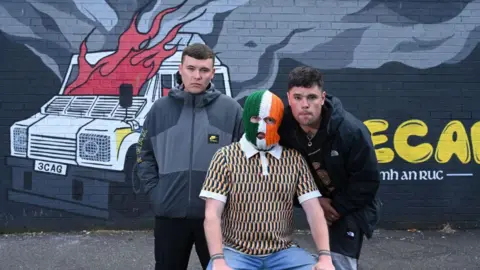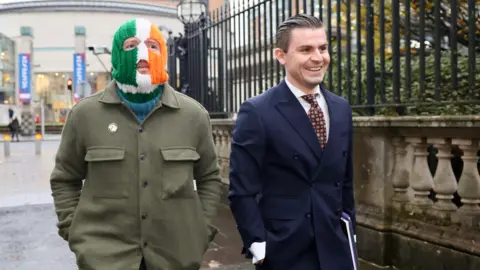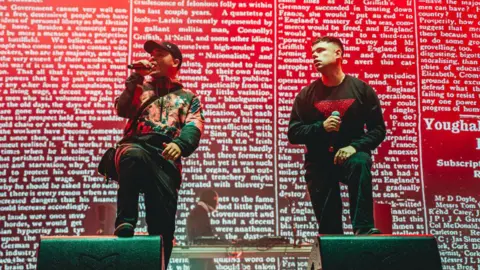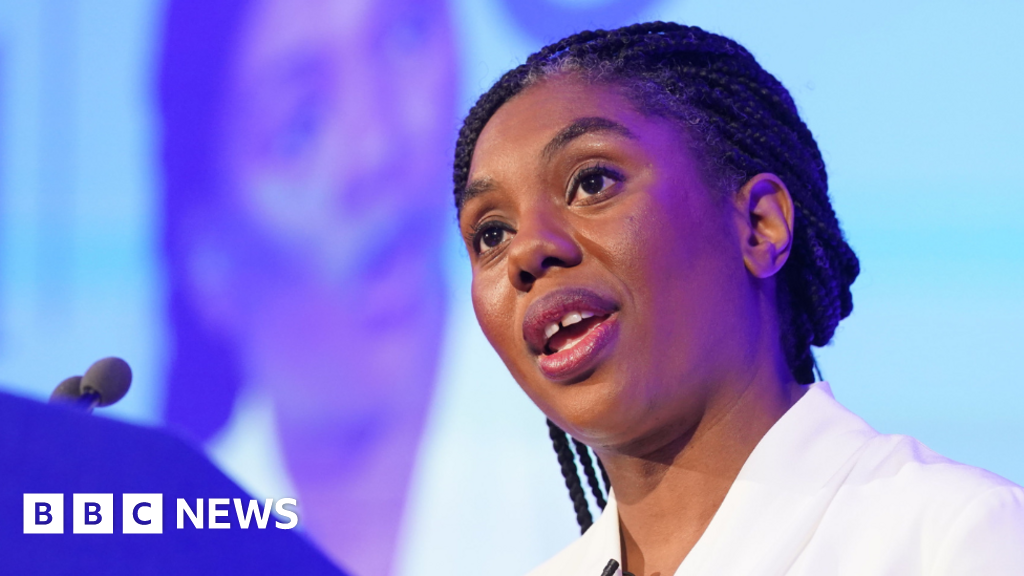 Michael Cooper
Michael CooperConservative Party leader Kemi Badenoch has said it is “unbelievable” that the Labour government have decided to no longer contest a discrimination case brought by Belfast rap group Kneecap.
The group won its case against the UK government over a decision Badenoch took when she was a minister to withdraw an arts grant.
The group was awarded £14,250 – the same amount they were initially granted.
A government spokesperson said the decision was made not to continue contesting the band’s challenge as “we do not believe it is in the public interest”.
They added: “This government’s priority is to try to reduce costs and help protect the taxpayer from further expense.”
Badenoch described the move as “yet another cowardly decision after giving away the Chagos Islands“.
“Labour will always capitulate rather than defend UK interests,” a spokesperson for the Conservative leader added.
The decision to block the grant, taken by Badenoch when she was business and trade minister, was described in court by Kneecap’s barrister as “unlawful and procedurally unfair”.
In a statement, the band said Badenoch and her department had “tried to silence us and they have failed”.
The band said it would split the £14,250 equally between two youth organisations who work with Protestant and Catholic communities in Northern Ireland “to create a better future for our young people”.

Kneecap originally applied for a grant allocated to support UK-registered artists in global markets in December 2023.
The group, who have faced controversy for their lyrics and political outlook, were successful in their application, but were subsequently blocked from receiving the funding after an intervention by the Department for Business and Trade.
At the time, then-UK Business Secretary Kemi Badenoch’s spokesperson said they did not want to hand taxpayers’ money “to people that oppose the United Kingdom itself”.
The band’s music and marketing heavily features themes relating to Irish republicanism and opposition to British rule in Northern Ireland.
The group have courted controversy and it claimed it was told a 2019 tour, entitled Farewell to the Union, had angered the then Conservative government.
Kneecap have also antagonised unionists in Northern Ireland – one of their best known records is called Get Your Brits Out, a parody rap in which the band go on an imaginary, drug-fuelled night out with prominent members of the Democratic Unionist Party (DUP).
 Pacemaker
PacemakerIn statement following Friday’s court hearing, band member DJ Próvaí said: “For us this action was never about £14,250, it could have been 50p.”
The group said its motivation for taking the case was “equality”.
“This was an attack on artistic culture, an attack on the Good Friday Agreement itself and an attack on Kneecap and our way of expressing ourselves.”
In a statement following the settlement, Badeonch’s spokesperson said “this case is not about whether a band promotes violence or hates the UK, as Kneecap clearly do; this is about whether government ministers have the ability to stop taxpayers’ money subsidising people who neither need nor deserve it”.
“Labour would rather waste your money than stand up to a group of Irish republicans who go to court because the UK government won’t hand them cash.”
‘Generosity and support’
Kneecap have said it will split the money awarded to them between two Belfast charities, Glór Na Móna in Ballymurphy and RCity Belfast on the Shankill Road.
Sarah Jane Waite, director of RCity Belfast, expressed the charity’s thanks for the “generosity and support from Kneecap”.
She said the donation will be used toward a number of projects, including both local and international programmes.
Meanwhile, Conchúr Ó Muadaigh, chairperson of Glór na Móna, said the support of Kneecap would have a “lasting on our work with young people and the Irish language revival here in west Belfast”.
Who are Kneecap?
 Luke Brennan
Luke BrennanKneecap are an Irish-speaking rap trio from west Belfast who have courted controversy with their provocative lyrics and merchandise.
The group was formed in 2017 by three friends who go by the stage names of Mo Chara, Móglaí Bap and DJ Próvaí.
Their rise to fame inspired a semi-fictionalised film starring Oscar-nominated actor Michael Fassbender.
The film gained rave reviews and won an audience award at the Sundance Film Festival.
However, the group has faced criticism and censorship over their politically-charged, expletive-filled and drug-referencing lyrics.
Their use of Troubles-related imagery has also offended some critics.


